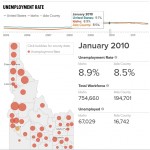Jobless In Idaho: Short-Term Work Is A Short-Term Fix
For months now, our “Jobless in Idaho” series has followed people here in Idaho as they search for work against hard odds. Kelly Barker, a single mom from Meridian, had been out of work for the better part of a year when we met her last winter. Since then, she’s made do with a combination of temp work, food stamps and unemployment benefits. In April, those benefits were running out.
Barker was scouring the web for job possibilities when we last met. It was a tense time, and Barker knew there was only one option. She had to find work. “I don’t have a contingency plan,” she said. “You know, a mortgage payment – you’d have to have a lot of savings to sustain you for a long period of time, and I don’t, so I have ten weeks to find a job. Period.”
Now, six weeks later, there’s good news. When I visited Barker in Meridian this week, she’d just come home from work. “I’m working in a call center,” she explained, “so when I get to work, I have to punch in a code in the phone and calls start coming immediately and – I’ve never worked in a call center before. It’s quite an experience.”
Barker is an upbeat person. The good part of the job is that the days fly by, she says. But when I ask how the job is working out financially, she’s frank. It’s not great. “I’m $21 above the cut-off limit for assistance, so it’s tough,” she says.
In other words, she’s making $21 dollars too much each month to be eligible for food stamps. She hasn’t taken a close look at the numbers, but it’s possible she has less income now than she did before, with food stamps and unemployment benefits. Still, she says, it’s better this way. “Really, who wants to live on unemployment insurance?” she asks. “I don’t. I want to be a working person in the workforce, to feel good about what I’m doing and have self-worth and know that I’m contributing to society. That’s just who I am.”
When Barker steps back and takes a look at her situation, she sees good and bad. On the upside, she’s managed to make her house payment every month, after a year without steady work. She’s proud of that. But there’s a lot to worry about, too.
Her call center job is short-term, through the summer. She’s depleted her savings, and she still can’t afford health insurance. Perhaps most frightening of all, her ex-husband just lost his job. That means their eight-year-old daughter is without health insurance, too. Barker could easily get overwhelmed, but that’s exactly what she tries not to do.
“You know, you can either look at the brighter end of things or the darker end of things,” she says, “and I think as a rational human being we look at both. But I have to choose the more positive because I don’t like how I feel if I go the other way.”
This isn’t how Barker thought her 40s would go. She mentioned that the first time we met. But what else can a person do, she says, but keep going.
Have you gotten a new job recently, or are you in the middle of a transition? Are you recently laid-off from work, or long-term unemployed? We want to hear your story. Go to our Work In Progress news app to connect with us.




